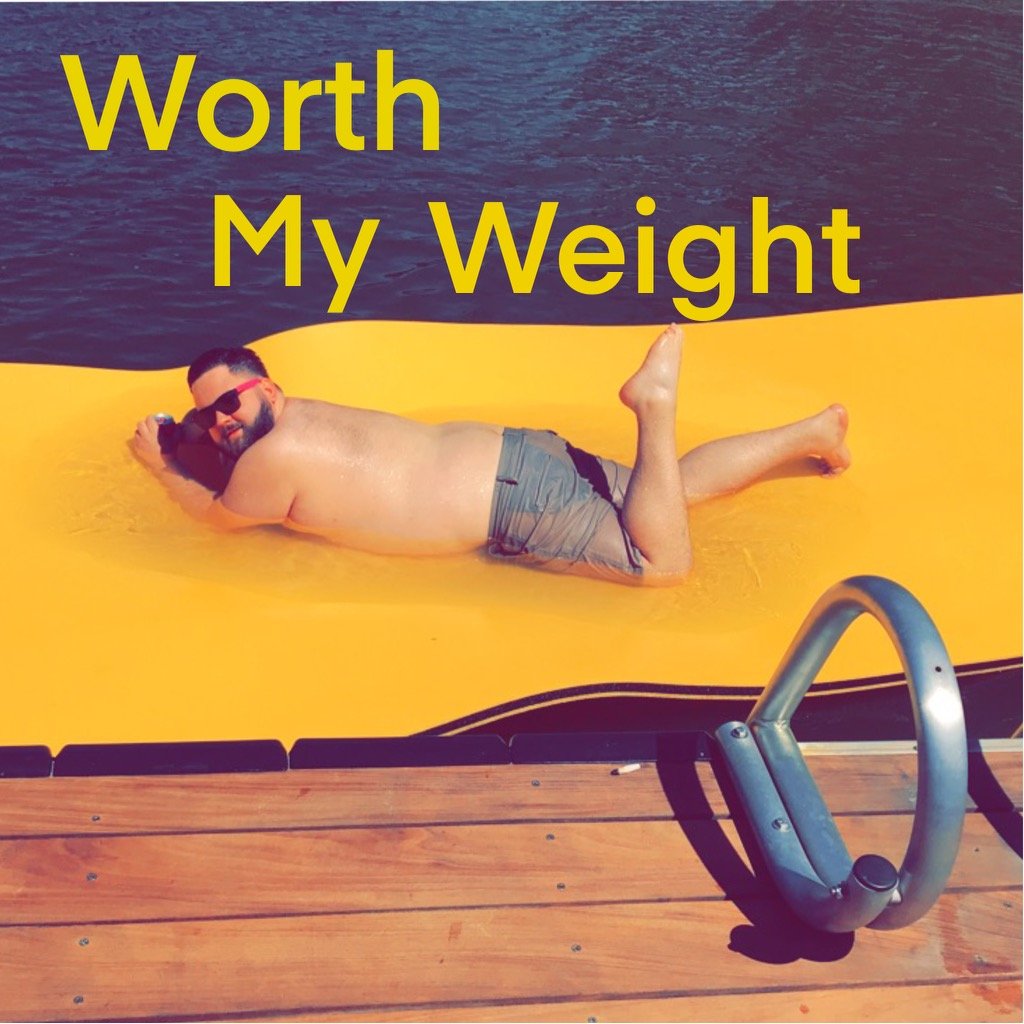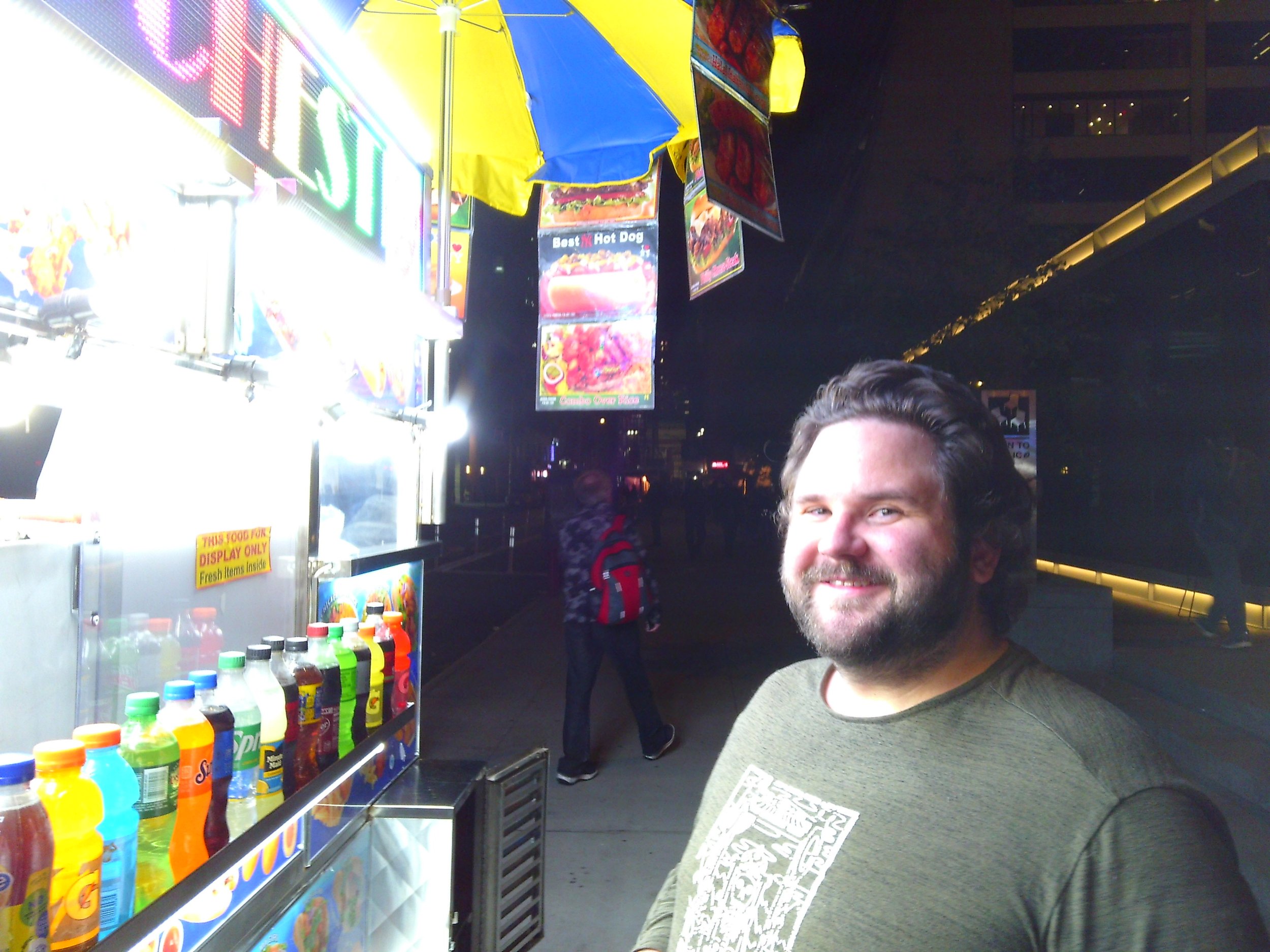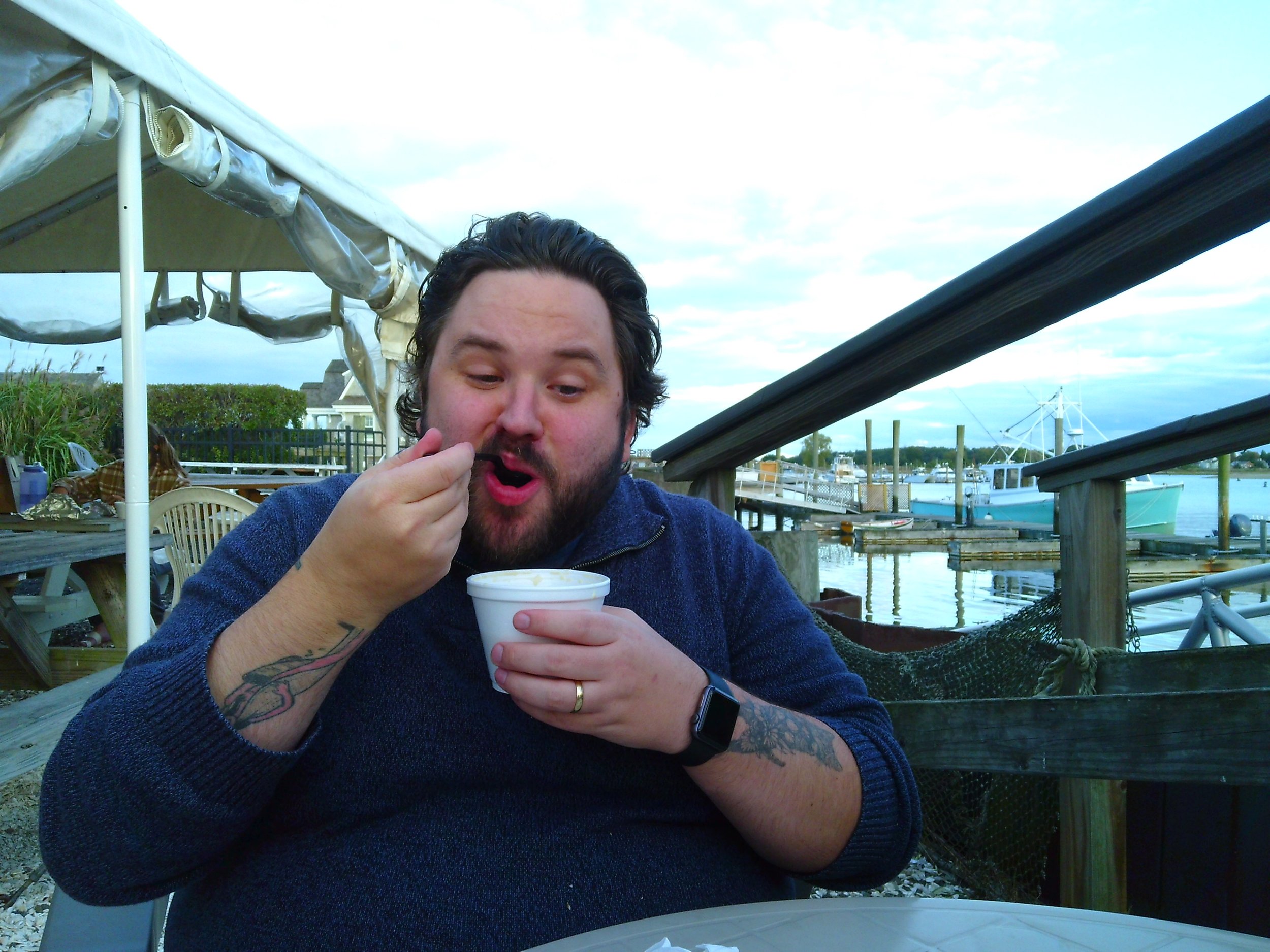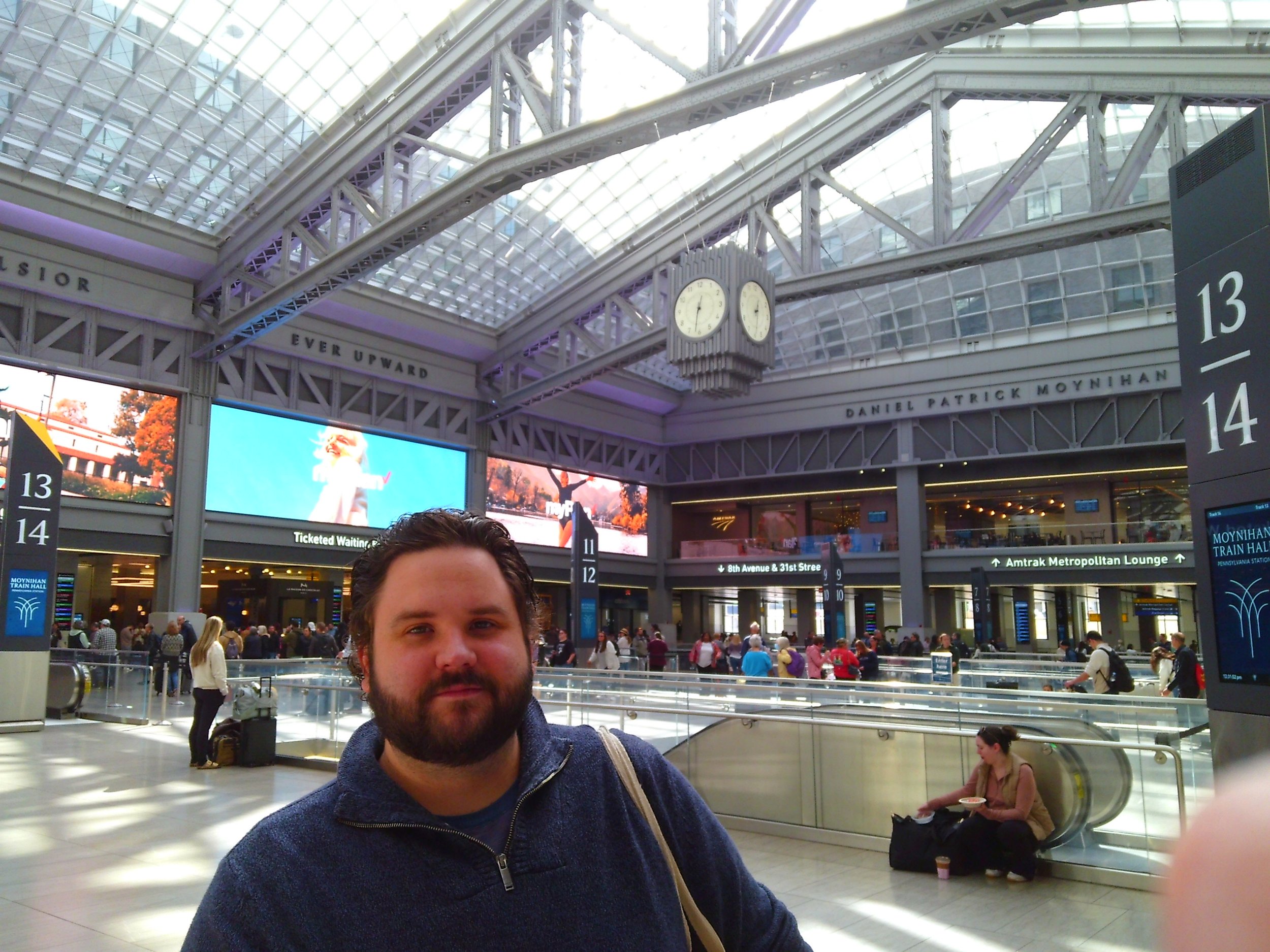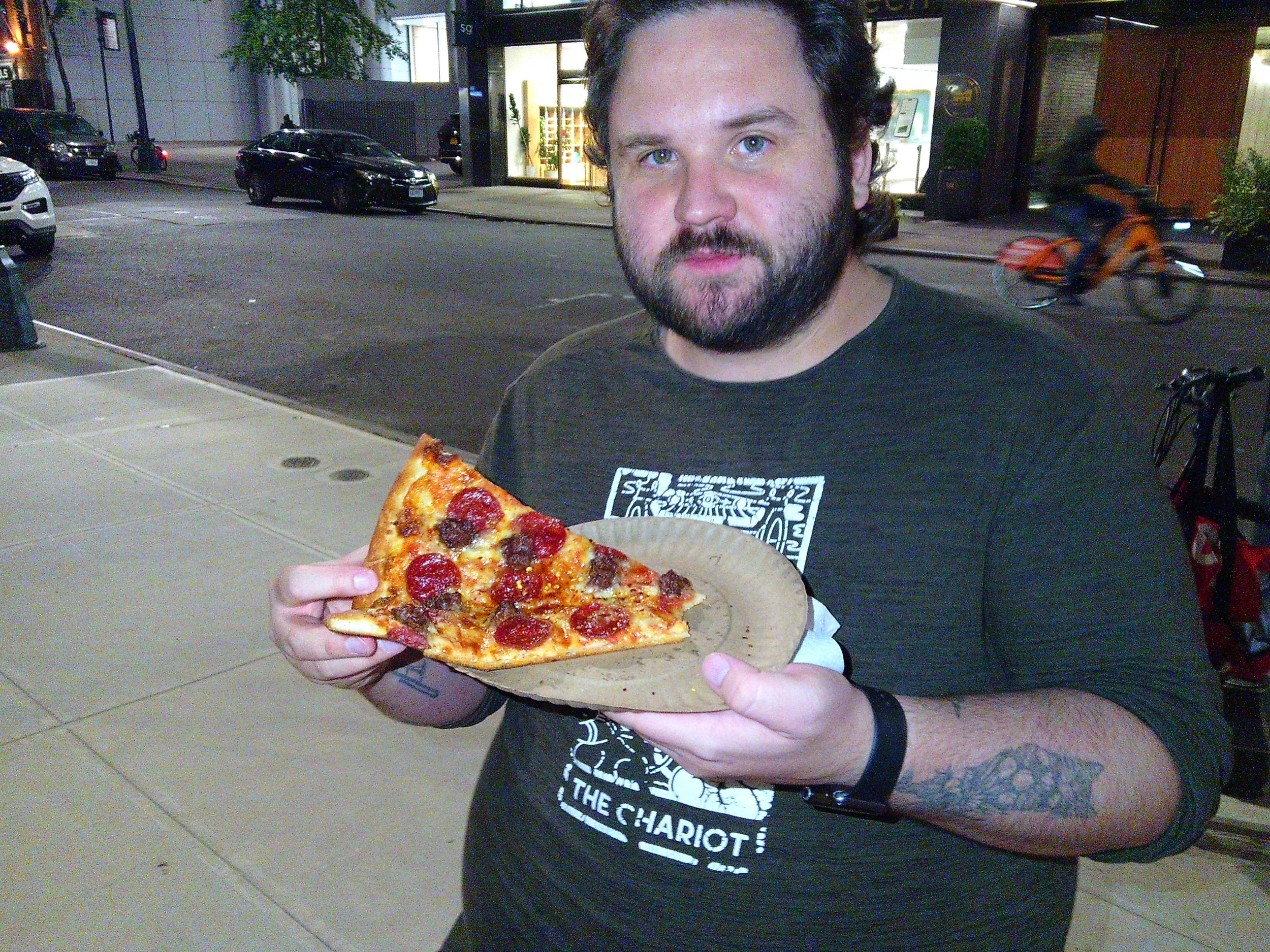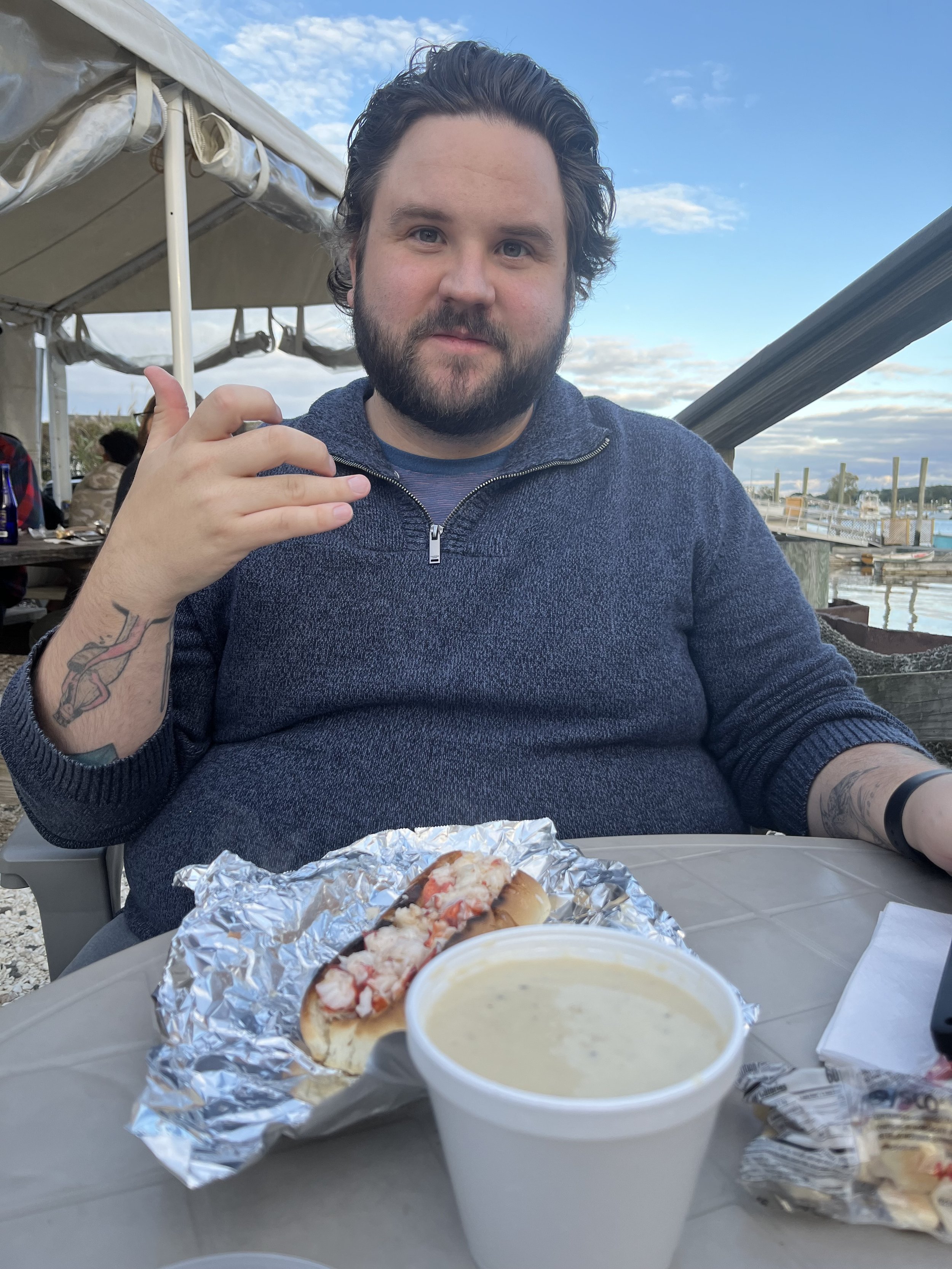Worth My Weight
I hit a milestone with my weight today — another one; they’re starting to stack. I’m 50 pounds down so far and below 300 for the first time since I crash-dieted in 2016. But I am worth more than my weight…whatever that may be at the time.
Before I got here, disordered eating and I were old friends. Nearly my entire life has been filled with the constant rollercoaster ride of body image issues, crippling anxiety, and inadequacy. I was always the fattest person in a group of people. The person who would force others to sit at a table instead of a booth. Booths are overrated anyway.
Anyway, I’ve lost 50 pounds. And I’m happy. But that doesn’t mean I wasn’t happy or felt ugly before. In fact, there are countless selfies on my phone documenting the times when I just felt so fucking sexy. I was smoldering into the camera because I saw it in myself. And I see it in other fat people, too. If you think sexiness has weight limits, please look at yourself more closely.
But being fat is hard. Being fat isn’t what I wanted to be. But before I knew I was fat, other people told me I was. I wish I could go back in time and tell Little Me how fat I actually wasn’t. And how beautiful I actually was (am).
Getting a hot dog after eating a piece of pizza. Pictured: Pure bliss.
In elementary school, someone joked that I needed a bra. It was after one of those presidential fitness tests where they count how many push-ups, pull-ups, and sit-ups you can do in front of your peers. We had to run a mile, and I tried to convince everybody — including myself — that my fitness levels were impressive. I sprinted the first lap. I felt my muscles spasm. I was the last one to cross the finish line by a long shot, sputtering around Coyote Creek’s field like a vintage car.
My parents told me to not let it get to me. But they weighed us for the test, too. Right in front of everybody. For children, it’s easy to giggle at the fatass. My brother told me to tell everybody that muscle weighs more than fat. I don’t think I ever used it. We all had eyes — I wasn’t rocking washboard abs but it was a nice gesture.
There’s another vivid memory: In high school, two fellow students made fun of me in the foreign language hallway for wearing a shirt with a hotdog and a bottle of mustard on it. It was tight — I remember second-guessing it that morning when I put it on. I thought maybe I was just being a bit self-conscious.
I didn’t hear what they said, but I saw them whisper to each other, look directly at me — the boy even pointed his finger before holding his limp hand to the side of his mouth — and burst out in laughter. I don’t know what they said, but I know it was hurtful. And they know I know it was hurtful.
I often wonder what they said, but I can imagine: It was probably a joke about me needing to eat fewer hot dogs like the one I had on my shirt. But I will never know — and they’ve probably forgotten — but it has never left my mind. I never wore that shirt again.
I fucking love clam chowder. Look at that face. Pure pleasure. Can’t wait for my next bowl tbh.
Every time I hear laughter in public, I think of that moment. About how skinny people are so brazenly open about hating fatness. How skinny people are mad when fat people exist near them in public, and how funny fat people are for trying to work out. Look at any TikTok comment section on a video of a fat person working out. Some people just want all of us to be dead.
I always think laughter in public has to do with me. And who I am. And how much space I’m taking up. And that’s what being fat is like. You don’t really comprehend how much mental weight fat people carry with them, too.
I’ve lost 50 pounds. But who cares? That’s not the first thing a stranger will notice about me. They’ll still see me as a fat person first until I get to a weight that’s desirable for them to look at. They won’t notice my curly hair or how green my eyes are when I step into the sun. They don’t know about my tenacity, my sensitivity, or my intelligence. They will notice my fat. Everything else comes second.
It took a lot of introspection to realize that I had an extreme binge-eating addiction. I mean, yeah, I knew there was a problem. But I didn’t know what to call it. Until last year.
In Season 45 of Survivor, one contestant, Jake O’Kane, opened up about his battle with food addiction and binge eating. He talked about the cyclical nature of binge eating and confidence. How fat people can become less confident because they are hyper-aware of their bodies, and how binge eating helps put a bandage on those problems and, ultimately, creates more weight gain. Which creates more insecurities. Rinse and repeat.
And when you don’t know you’re suffering from binge eating, you don’t realize how silent you are about it. Nobody in our lives will know about our struggles until we face them — and that’s because, like other addicts, we’re good at hiding it. And, if fat people know anything, it’s how to not put our weight on others. Society has made our weight a sensitive subject that is a faux pas to acknowledge. This, in turn, makes not acknowledging our weight easier for skinny people.
Before meals, it wasn’t out of the ordinary for me to put a dent in a family-size bag of Doritos. If I had leftover takeout, I’d eat entire white boxes before meals because leftovers wouldn’t satisfy me if I wanted to eat them as a meal.
I would also volunteer to pick up food. At the drive-through window — or on the food delivery app — I would order myself an extra item or two on top of my meal. I’d eat these quickly in my car on the way back home — stuffing the fast food wrappers in the pocket of my driver’s side door until I found a way to discreetly dispose of them.
Eating in my car on the way to events was normal, too, because I would convince myself that putting my appetite in others’ hands would never satiate me. Gas station hotdogs, slices of pizza, and even Whopper meals weren’t off the table before a baby shower or wedding reception. Then, on the way home — my shoes peeled off my sore feet, socks exhaling in my Honda Accord — I’d probably pick up something else to eat, too. My Taco Bell order would fluctuate, but the one I ordered most often was as follows:
A Beef Chalupa Combo Meal (2 Chalupas + 1 crunchy taco) and a Large Baja Blast
A soft taco
A Beefy 5-Layer Burrito that I would eat in secret on my way home
If you’re counting, this was nearly a day’s worth of calories (1,990) that I would use like emotional supplements.
My food addiction stemmed from my mother’s death — much like nearly everything else about me, this was my origin point. Everything before was technicolor. Her death was like switching channels on a fuzzy box television. There’s a lot of darkness there — and a lot I don’t remember.
I was 13, and recently learned I was gay — great combo! — then the one person who I thought would understand it the most was ripped away from me. I was also on Adderall (BabyMeth®), which stabilized my mood but fucked with my body. I spent my days with no appetite — my friends would sometimes beg me to eat more than a banana and a bottle of water at lunch — and my nights were spent eating all the food I could get my hands on.
I don’t know if I ever hated my fatness. Others hated my fatness, which made me resent my fatness and hate myself because of it. Does that make sense? I resented my fatness in 2017 when I went to Universal Studios and had to test the roller coaster seats before standing in line — many of which I couldn’t fit in. I would rush to the seat, usually sitting right by the queue, squeeze myself in quickly, and pull the harness down. When I didn’t fit — which was often; fuck you, Universal Studios — I’d remove myself from the seat just as quickly, holding my head down and scurrying away to avoid eye contact. I resented my fatness in 2018 when flying to New Orleans, and again in 2022 when flying to San Diego, and once more in 2023 when flying to New York City.
Me at Penn Station thinking about the clam chowder and lobster rolls I was going to have later that day.
Nobody hates flying as much as a fat person — though the person sitting next to a fat person might disagree. But if it weren’t for the small seats, short seatbelts, and wandering eyes from the other passengers who are clearly thinking “Please don’t sit next to me,” airplanes wouldn’t be such a horrible experience for fat people. And, now that I’m thinking about it, isn’t it wild how we just don’t accommodate people? But if corporations ever made a plus-sized section of an airplane, they would make fat people pay double for them. Fat people will never be allowed to travel with dignity by plane.
I resented my fatness whenever I thrifted — or whenever I saw skinny people “restyling” the rare vintage clothes that were made for bodies like mine. Finding a 2XL in a thrift shop? Fucking forget about it. It’s nearly impossible. I’m just saying, don’t be surprised the next time you go thrifting and find your fat friend milling about near the hats or sunglasses. They do it because they know they can’t even browse for clothes in their size. But, like all other things, we push our feelings of inadequacy aside to help you to find the good shit.
I resented my fatness in concert venues. I always felt like I was taking up two spots. And the laughter. The laughter at concerts is, at times, the only thing I can hear. It’s the two kids from high school in the halls. How could the laughter be about anything else other than me? The fat person in front of them.
Movie theaters and drive-thru lanes became the only places where I felt comfortable. And even in these relatively dark, safe spaces, I’d find myself riddled with anxiety. What if the drive-through attendant notices how much food I’m going to order? I’d ask myself. What will they think of me? Or, if I was tasked with buying things for myself and my husband, the thought would shift to something like: Thank God I’m getting two drinks, or else they might think this is all for me. Or maybe they think I’ll eat these two meals solo.
In theaters, I’d often hope that nobody would sit next to me because I didn’t want them to deal with my love handles spilling over the armrest.
My fatness doesn’t define me, but our society forces my fatness to shape others’ definitions of me. All of my other traits are based, in some way, on the perception of my fatness: how seriously people will take me, how much they’ll listen to me, and if they’ll decide that I’m being dramatic instead of practical. It all ties back to my weight in some way.
Eating a piece of pizza before I get a hotdog.
My calorie tracker has been asking me to take progress pics every time I reach a milestone. I started doing this to see my results, and I posted some results on Instagram and I got the most engagement I’ve ever seen. It made me rethink my journey and what I was actually doing it for. Was I doing it for myself, my resentment, or for the praise of others?
I had a discussion with my friend, Cass, about before-and-after pics. They write about them more eloquently than I ever could in their blog post I link below. After some introspection and discussion, I asked myself a few things: Were these progress pictures a celebration of my weight loss? Or an avenue for others to tell me, “You look good!” Does a direct comparison and an “after” suggest that I didn’t look good before? Are progress pictures an invitation for people to call my old self hideous by calling my new self attractive? Or are they a way for me to say, “Look at my hard work”?
Many things are true: People can tell me that I look good without disparaging the way I looked before. One compliment doesn’t equate to an insult of my former self. People can be happy for me for accomplishing a goal without assuming that the goal was born from self-hatred or disgust — or that they feel any hatred or disgust for who I was (and still am). But, conversely, people can also say “You look good” to imply that I didn’t before. They can be happy for me with the assumption that I was knocking on death’s door in my “before.”
All I can do is hope and assume their intentions are good.
Wanting to be free of judgment isn’t unnatural for a person who has lived with it their entire life. I don’t see myself as fatphobic for wanting to shed my weight. I just want to live comfortably in a fatphobic society that won’t allow me to be perceived as more than my fatness. Wanting strangers to look at you with anything other than disgust or apathy is something we should all desire.
On TikTok, a man documents his daily treadmill workouts. Sure, he links the treadmill in his TikTok shop to boost views and engagement a bit, but he starts each video with a simple statement: “I’m fat and I don’t want to be anymore.”
And I think that’s just the heart of it. I’m fat — and I love myself — but I just don’t want to be fat anymore. And there’s no self-hatred. There’s no desire for immediate results. There’s patience and an abundance of love.
After all of this, I still have a healthy relationship with food. I just eat less of it — and it remains a source of joy. Next time I go to New York, I’ll get a slice of pizza and a hot dog. Maybe even within the same night, like I did before. Hell, I might even take the train up to Connecticut again and get more lobster rolls and clam chowder. As you can see…it was worth it.
